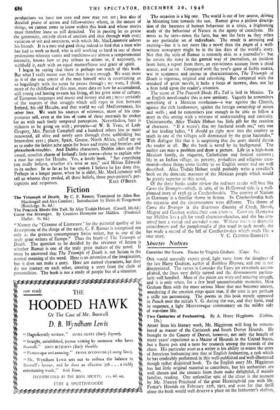Fiction
The Triumph of Death. By C. F. Ramuz, Translated by Allen Ros. Macdougall and Alex Comfort ; Introduction by Denis de Rougement (Routledge. 8s. 6d.)
The Peacock Sheds His Tail. By Alice Tisdale Hobart. (Cassell. 10s.6d.) Came the Stranger. By Countess Hermynia zur Miihlen. (Frederick
" NAMED the C.6zanne of Literature ' for the pictorial quality of his descriptions of the things of the earth, C. F. Ramuz is recognised not only a3 the greatest contemporary Swiss writer, but as one of the truly great writers of Europe." Thus the blurb cf The Triumph of Death. The question to be decided by the reviewer of fiction is whether Ramuz is one of the truly great makers of the novel. It must be answered that The Triumph of Death is not fiction in the normal meaning of the word. Here is an invention of the imagination, but it does not make a story. Here are named characters, but they do not interact on each other, creating a story from the clash of personalities. The book is not a study of people but of a situation. The occasion is a big one. The world is out of her course, driving in blistering heat towards the sun. Ramuz gives a pitiless descrip- tion of the baseness of human behaviour in a crisis, a frightening study of the behaviour of Nature in the agony of cataclysm. He notes as he sees—notes the facts, but not the facts as they relate to any particular set of individuals. The result is arresting and exciting—but it is not more like a novel than the pages of a well- written newspaper might be in the last days of the world's story. Not that the style of Ramuz is remotely akin to a journalist's: but he covers the story in the general way of journalism, an incident from here, a report from there, an eye-witness account from a third source, and so on. Compared with the year's spate of feeble stories, wet in sentiment .and untrue in characterisation, The Triumph of Death is vigorous, original and refreshing. But compared with the standard of great' novels, it lacks a focus of interest, does not lay a firm hold upon the reader's attention.
The scene of The Peacock Sheds His Tail is laid in- Mexico. To an English novel-reader this is new territory. Vaguely he remembers something of a Mexican revolution—a war against the Church, against the rich landowners, against the foreign ownership of mines and wells ; and he remembers just -enough to be able to follow a story in this setting with a mixture of understanding and curiosity. Unfortunately, Alice Tisdale Hobart has little gift for the creation of character. " If it weren't that my husband needs me," says one of her leading ladies, " I should go right now into the country to teach in one of the villages still dominated by the great haciendas." With dialogue like that it is surprising that the story should detain the reader at all. But the book is saved by its background. The author can state a problem and draw a picture. Life in a high-born Mexican family, its etiquette, Catholicism and 'festival customs ; life in an Indian village, its poverty, prejudices and religious cere- monial—these things come freshly to an English reader and are well described. Alice Tisdale Hobart could probably write a traveller's book on the domestic manners of the Mexican people which would be greatly superior to this novel.
Of the three books under review the ordinary readet will best like Came the Stranger—which, in spite of its Hollywood title, is a well- planned story of r938-39 in Czechoslovakia. The coming of Nazism in Germany is a familiar theme in fiction. In Czechoslovakia both the occasion and the circumstances were different. The theme of Came the Stranger is the disastrous disunity of Czech, Slovak, Magyar and German within their own coup--ey. Coun-ess Hermynia zur MUhlen has a gift for small character-sketches, and she has con- trived here a varied and crowded scene. Without resc-t to dramatic coincidences and the paraphernalia of plot usual in such novels, she has made a record of the fall of Czechoslovakia which reads like a
Muller. 8s. 6d.)


































 Previous page
Previous page